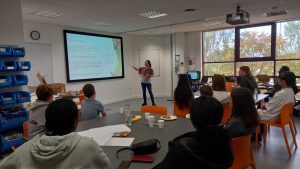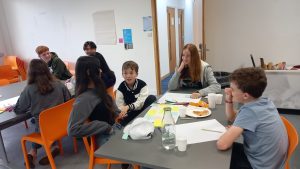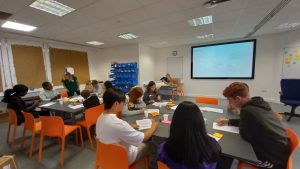By Louca-Mai Brady,
Our YPAG group had another in-person meeting on Saturday 23rd of September, where we all met at the university again! We started off the meeting with the classic icebreaker game – two truths and one lie – butthis time with a theme, which was based on what we all did over the summer holidays. It was great hearing about what everybody was up to while we were all away from school – over two people pretended that they had gone to Germany! 😆
We then all had a lunch break, and enjoyed some great pizza with wedges and salad🍕. This gave us all time to catch up on other things, such as what it was like starting our new school year.
After we settled in, we had a session with Claire about the SALIENT project, and how shopping sustainably could possibly help our world grow greener. We talked about problems that food banks can face when trying to give people healthy food – these problems include how people usually donate unhealthy snacks like crisps. These foods may be more donated and more likely to be taken in by those in need because of how they don’t go off as quickly, and with how they are cheaper than many other healthier options.

Claire showed us an online web “plug-in” that would work on online food shopping websites. They are currently researching how it would work – it is a plug-in that tells the shopper how sustainable a product is, on a scale of A-G. The most sustainable products had a green A at one end of the scale, whereas the least sustainable products had a red G at the other end. I personally thought that this plug-in was interesting, as it would definitely change the way I would buy products online! If the scale in the plug-in showed me that a product was less sustainable, I would be more likely to avoid that product.
But, we also came up with a few suggestions to make the scale’s purpose clearer to shoppers using it. For example:
We all had a go at using the plug-in together, and we tested the plug-in out on products and brands that we eat for breakfast, packed lunch, and for snacks. It was surprising to see the relationship between the unhealthiness of products (such as crisps) and unsustainability – a common trend with popular foods and brands that we checked was that unhealthy food tended to be more unsustainable. This could be because of the use of palm oil, and other factors. We all agreed that the plug-in would make us think twice about our shopping choices – however, we weren’t certain if our parents would use it, for example if they would know how to use the technology in the first place!
Claire said:
The YPAG were really engaged when we were talking about online food shopping. They made great suggestions about how we could improve the visuals and were very informative about lunchtime and snack habits.
In addition, the activity started the great Quaker Oats war that lasted the entire meeting – a debate, questioning if Quaker Oats were, or weren’t, a good breakfast item. The side for Quaker Oats was pioneered by Stela, whereas the side against Quaker Oats was led by Jacob. Ultimately, the fierce battle ended with a stalemate – which, who knows, may continue to the next YPAG meeting.
Afterwards, we had a break! We enjoyed cupcakes to celebrate some of the birthdays that happened over the summer holidays while we were away 🥳. The cupcakes were delicious! Some of us also had a go at using the plug-in ourselves individually, putting in our favourite foods and seeing if they were sustainable or not. We tried playing Uno but unfortunately didn’t have enough time – hopefully, we can get around to playing it next meeting!
Then, Charlotte from Young People’s Mental Health came to talk to us about research they’re planning on the links between physical activity and young people’s mental health! We talked about how this could include walking to school or moving in drama class, as well as other activities such as running or football where you might break a sweat. We learned about how being active can cause things to happen in our bodies (for example our gut and the good bacteria in it) that can affect our mental health. Then we talked about what activities our schools offer and then thought about what physical activities we would like to do. For example – I would adore it if there were facilities at my school, or more facilities in Stevenage in general, that would help me learn to rollerskate ! Other young people suggested swimming pool facilities, and more.
Charlotte asked us whether advice from a healthcare professional to take part in physical activities would make us want to do them more. We thought about this from the point of view of someone struggling with mental health problems and came up with some points:

Overall, the session really made me think about how important physical health is for my mental health, and definitely encouraged me to try and improve my physical health! The part where we discussed factors as to why doing physical activity may possibly be difficult for young people was additionally a thought-provoking segment, and I had a lot of ideas for it. It made me feel more empathetic towards other people! Charlotte said:
“It was very helpful to consult the YPAG on our early stage project. The group gave very interesting feedback, and identified a key element of our project design that needed to be changed to encourage participant engagement. The session was not only useful for our research, it was also fun to talk through our work with the group and hear their opinions.”
We then started thinking about making posters to recruit more members! We looked at the old posters and thought about what might make them better – we also looked over other examples as inspiration. Some of us even had a go at designing our own posters 🎨.
We agreed that the poster should:
As a whole, the meeting was super productive and inspiring as always – and I can’t wait for the next one, online!
Cherish